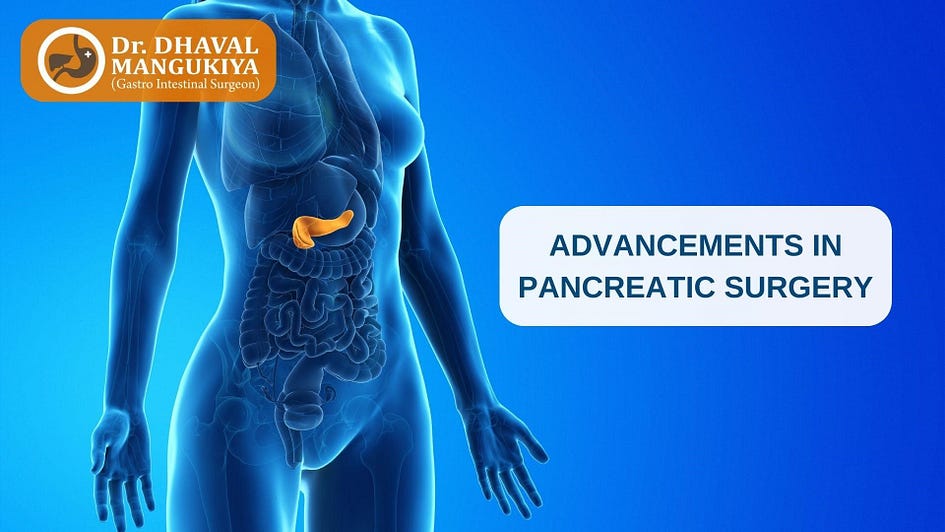Advancements in Pancreatic Surgery: What Patients Need to Know

Pancreatic surgery has long been considered one of the most complex and challenging areas of surgical oncology. However, recent advancements in technology, surgical techniques, and perioperative care have significantly improved outcomes for patients undergoing pancreatic procedures. This blog post will explore these advancements used by the best pancreatic surgeons in Surat and what they mean for patients facing pancreatic surgery.
1. Minimally Invasive Techniques
One of the most significant advancements in pancreatic surgery is the increased use of minimally invasive techniques. Laparoscopic surgeries are becoming more common for certain pancreatic procedures.
Laparoscopic Surgery:
Laparoscopic pancreatic surgery involves making several small incisions rather than one large one. Through these incisions, surgeons insert a camera and specialized instruments to perform the procedure. The best laparoscopic surgeons in Surat, like Dr Dhaval Mangukiya, prefer to use this approach since it results in less pain, shorter hospital stays, and faster recovery times compared to traditional open surgery.
Benefits for Patients:
- Reduced postoperative pain
- Shorter hospital stays
- Faster return to normal activities
- Smaller scars
- Potentially lower risk of surgical site infections
It’s important to note that not all pancreatic surgeries can be performed using minimally invasive techniques. The appropriateness of these approaches depends on various factors, including the type and location of the pancreatic disease, the patient’s overall health, and the surgeon’s expertise.
2. Enhanced Recovery After Surgery (ERAS) Protocols
ERAS protocols are evidence-based care pathways designed to achieve early recovery for patients undergoing major surgery. The best gastrointestinal surgeons in Surat admit that these protocols have been successfully applied to pancreatic surgery, leading to improved outcomes and patient experiences.
Key Elements of ERAS in Pancreatic Surgery:
- Preoperative counselling and nutrition optimization
- Minimizing preoperative fasting and carbohydrate loading
- Standardized anaesthetic and analgesic regimens
- Early mobilization after surgery
- Early initiation of oral intake
- Prevention of postoperative nausea and vomiting
Benefits for Patients:
- Reduced length of hospital stay
- Decreased postoperative complications
- Improved pain management
- Faster return to normal function
- Potentially lower healthcare costs
3. Precision Medicine and Personalized Treatment
Advancements in molecular profiling and genetic testing have paved the way for more personalized approaches to pancreatic cancer treatment, including surgery.
Neoadjuvant Therapy:
For some patients, chemotherapy or radiation therapy before surgery (neoadjuvant therapy) may be recommended. This approach can help shrink tumours, making them easier to remove surgically, and may also help identify patients who are most likely to benefit from surgery.
Targeted Therapies:
Understanding the genetic makeup of pancreatic tumours allows for the use of targeted therapies. While these are primarily used in non-surgical treatments, they can complement surgical approaches in overall pancreatic cancer management.
4. Intraoperative Imaging and Navigation
Advanced imaging techniques are improving surgeons’ ability to precisely locate and remove pancreatic tumours.
Intraoperative Ultrasound:
High-resolution ultrasound probes used during surgery help surgeons identify small tumors and assess their relationship to critical blood vessels.
Fluorescence-Guided Surgery:
This technique involves injecting fluorescent dyes that accumulate in cancer cells, making them easier for surgeons to visualize and remove during the procedure.
Benefits for Patients:
- More complete tumour removal
- Reduced risk of damaging healthy tissue
- Potential for improved long-term outcomes
5. Management of Pancreatic Fistulas
Pancreatic fistulas, a leakage of pancreatic fluid, are a common and serious complication of pancreatic surgery. Dr Dhaval Mangukiya, one of the best gastro surgeons in Surat, shares that recent advancements have improved the prevention and management of this condition.
Preventive Measures:
- Improved surgical techniques for pancreatic anastomosis
- Use of somatostatin analogs to reduce pancreatic secretions
- Selective drainage strategies
Management Strategies:
- Early detection through drain fluid analysis
- Minimally invasive drainage procedures
- Endoscopic techniques for fistula closure
These advancements have led to a reduction in the incidence and severity of pancreatic fistulas, improving overall surgical outcomes.
Conclusion
The field of pancreatic surgery has seen remarkable advancements in recent years, offering new hope to patients facing pancreatic disease. Minimally invasive techniques, enhanced recovery protocols, precision medicine, advanced imaging, improved complication management, and multidisciplinary care have all contributed to better outcomes and experiences for patients.
For patients facing pancreatic surgery, staying informed about these advancements can help in having productive discussions with healthcare providers. It’s important to ask questions about the latest treatment options, the surgeon’s experience with various techniques, and what to expect before, during, and after the procedure.
Comments
Post a Comment